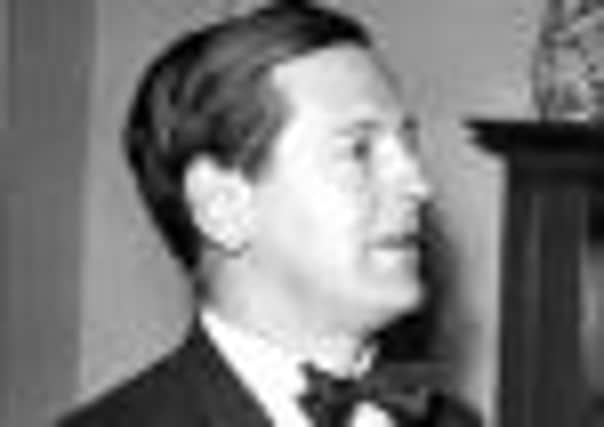Obituary: Sir Denis Forman, television executive.


Denis Forman was a significant force in British independent television and ensured Granada Television was a pioneer in making incisive and imaginative programmes. He presided over the creation of the acclaimed series The Jewel in the Crown and such ground-breaking programmes as World in Action, University Challenge and Family at War. He had misgivings about Coronation Street but decided “to let the programme makers have their head”. It was a shrewd decision. Forman was a canny picker of new talent and he selected such future stars as Michael Parkinson, Kenny Everett, Anna Ford and Germaine Greer to work early in their careers at Granada.
Forman was a powerful force in advocating that ITV remain independent and eschew absolute commercialism. He considered the business of chasing ratings was counter-productive and stifled originality. Forman’s philosophy was simple: Granada should make programmes that were popular and good.
Advertisement
Hide AdAdvertisement
Hide AdForman wrote three autobiographical books. The first, Son of Adam, was made into a feature-length film (My Life So Far) and dealt with his childhood in Dumfries in the 1920s. He wrote of fishing for trout (and swimming in the freezing water) and learning Scottish country dancing.
The film centred around Forman’s father, a strict disciplinarian, who served as chaplain at Loretto School in Musselburgh and marched the family off to St Mary’s United Free in Moffat. The film depicts a by-gone era in Scottish rural life, with Forman’s father played by Colin Firth.
John Denis Forman was brought up in a splendid Palladian mansion near Moffat which had been in his mother’s family for several generations. From 1931 he attended Loretto, where he was head boy in 1936. He stayed in contact with the school and served as a governor from 1949 to 1966.
Forman then went up to Pembroke College, Cambridge initially to read classics but switched to rural economy. On the outbreak of war he was commissioned into the Argyll and Sutherland Highlanders and in 1942 instructed troops at a battle school firstly at Barnard Castle then in Orkney and Shetland.
In 1943 his unit was dispatched to Italy and in the following year was involved in the fierce battle at Monte Cassino. He led an unsuccessful attack on a German position but a smoke canister badly damaged his left leg. Forman had the leg amputated in a field hospital and was returned to the UK. When back with his regiment he was sent to Dehradun in India to assist in the handover of the military academy to the Indians.
In 1948 Forman was appointed director of the British Film Institute, whose membership he greatly increased, and founded the National Film Theatre. In 1955 he joined Granada, where his ability to promote and nurture imaginative programmes was evidenced by his first commission, What the Papers Say. That was followed by local news programmes and the pioneering World in Action, which set a standard for investigative journalism.
Forman encouraged young talent both behind and in front of the camera. One of his early discoveries was Jeremy Isaacs, who first directed at Granada and then founded Channel 4. Forman worked closely with Isaacs when the former was the chairman of the Royal Opera and Isaacs was the artistic director. In his autobiography Isaacs describes Forman as “my mentor… a man who had a robust and cheerful demeanour in the face of criticism”.
Forman’s first experience of filming in India was in 1978 when he produced Staying On in Shimla with Trevor Howard and Celia Johnson. Their performances, together with the magical scenery, proved hugely popular and gave Forman the confidence to film the far more costly and challenging Jewel in the Crown in 1984.
Advertisement
Hide AdAdvertisement
Hide AdAs executive producer in both, he demonstrated a sureness of touch and a shrewd understanding of what would work on television. The cast for Jewel in the Crown (Peggy Ashcroft, Charles Dance, Tim Piggott-Smith and Art Mallik) was hand-picked by Forman and the series was a triumphant success. One reviewer wrote: “The series is spellbinding.”
In 1990 Forman ceased being a director of Granada, which gave him time to concentrate on his interests such as opera, music and writing. His Mozart Piano Concertos analysed each concerto with a loving care and, as if to let his hair down, Forman also wrote the Good Opera Guide, which took an affectionate, if somewhat irreverent, look at the art. The selection of artists, gossip and operas Forman freely admitted were “on the author’s whim”.
Forman never lost his love of Scotland and returned often to fish. He loved fly-fishing but had a particular interest in worm fishing with brandled worms in clear, free-flowing burns. “It is more skilful than dry fly fishing,” he considered.
Denis Forman, who was knighted in 1976 and served on numerous film boards – including as chairman of the Scottish Film Production Fund – was first married first to Helen Blondel de Mouilpied.
She died in 1987 and in 1990 he married Moni Cameron, who survives him with two sons of his first marriage.